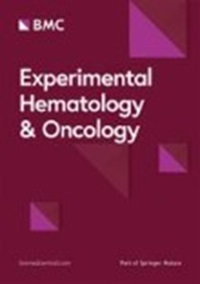Crosstalk between colorectal CSCs and immune cells in tumorigenesis, and strategies for targeting colorectal CSCs
IF 9.4
1区 医学
Q1 HEMATOLOGY
引用次数: 0
Abstract
Cancer immunotherapy has emerged as a promising strategy in the treatment of colorectal cancer, and relapse after tumor immunotherapy has attracted increasing attention. Cancer stem cells (CSCs), a small subset of tumor cells with self-renewal and differentiation capacities, are resistant to traditional therapies such as radiotherapy and chemotherapy. Recently, CSCs have been proven to be the cells driving tumor relapse after immunotherapy. However, the mutual interactions between CSCs and cancer niche immune cells are largely uncharacterized. In this review, we focus on colorectal CSCs, CSC-immune cell interactions and CSC-based immunotherapy. Colorectal CSCs are characterized by robust expression of surface markers such as CD44, CD133 and Lgr5; hyperactivation of stemness-related signaling pathways, such as the Wnt/β-catenin, Hippo/Yap1, Jak/Stat and Notch pathways; and disordered epigenetic modifications, including DNA methylation, histone modification, chromatin remodeling, and noncoding RNA action. Moreover, colorectal CSCs express abnormal levels of immune-related genes such as MHC and immune checkpoint molecules and mutually interact with cancer niche cells in multiple tumorigenesis-related processes, including tumor initiation, maintenance, metastasis and drug resistance. To date, many therapies targeting CSCs have been evaluated, including monoclonal antibodies, antibody‒drug conjugates, bispecific antibodies, tumor vaccines adoptive cell therapy, and small molecule inhibitors. With the development of CSC-/niche-targeting technology, as well as the integration of multidisciplinary studies, novel therapies that eliminate CSCs and reverse their immunosuppressive microenvironment are expected to be developed for the treatment of solid tumors, including colorectal cancer.结直肠癌干细胞与免疫细胞在肿瘤发生过程中的相互关系,以及针对结直肠癌干细胞的策略
癌症免疫疗法已成为治疗结直肠癌的一种前景广阔的策略,而肿瘤免疫疗法后的复发问题已引起越来越多的关注。癌症干细胞(CSCs)是一小部分具有自我更新和分化能力的肿瘤细胞,对放疗和化疗等传统疗法具有抗药性。最近,CSCs 被证实是免疫疗法后肿瘤复发的驱动细胞。然而,CSCs 与癌症龛位免疫细胞之间的相互作用在很大程度上还没有定性。在这篇综述中,我们将重点讨论结直肠干细胞、干细胞与免疫细胞之间的相互作用以及基于干细胞的免疫疗法。结直肠癌 CSCs 的特点是表面标志物(如 CD44、CD133 和 Lgr5)的强表达;干性相关信号通路(如 Wnt/β-catenin、Hippo/Yap1、Jak/Stat 和 Notch 通路)的过度激活;以及表观遗传修饰紊乱,包括 DNA 甲基化、组蛋白修饰、染色质重塑和非编码 RNA 作用。此外,结直肠癌 CSCs 表达异常水平的免疫相关基因,如 MHC 和免疫检查点分子,并在多个肿瘤发生相关过程中与癌症龛细胞相互作用,包括肿瘤的发生、维持、转移和耐药性。迄今为止,许多针对 CSCs 的疗法已得到评估,包括单克隆抗体、抗体药物共轭物、双特异性抗体、肿瘤疫苗、收养细胞疗法和小分子抑制剂。随着 CSC/小分子靶向技术的发展以及多学科研究的整合,有望开发出消除 CSCs 并逆转其免疫抑制微环境的新型疗法,用于治疗包括结直肠癌在内的实体瘤。
本文章由计算机程序翻译,如有差异,请以英文原文为准。
求助全文
约1分钟内获得全文
求助全文
来源期刊

Experimental Hematology & Oncology
Medicine-Oncology
CiteScore
12.60
自引率
7.30%
发文量
97
审稿时长
6 weeks
期刊介绍:
Experimental Hematology & Oncology is an open access journal that encompasses all aspects of hematology and oncology with an emphasis on preclinical, basic, patient-oriented and translational research. The journal acts as an international platform for sharing laboratory findings in these areas and makes a deliberate effort to publish clinical trials with 'negative' results and basic science studies with provocative findings.
Experimental Hematology & Oncology publishes original work, hypothesis, commentaries and timely reviews. With open access and rapid turnaround time from submission to publication, the journal strives to be a hub for disseminating new knowledge and discussing controversial topics for both basic scientists and busy clinicians in the closely related fields of hematology and oncology.
 求助内容:
求助内容: 应助结果提醒方式:
应助结果提醒方式:


